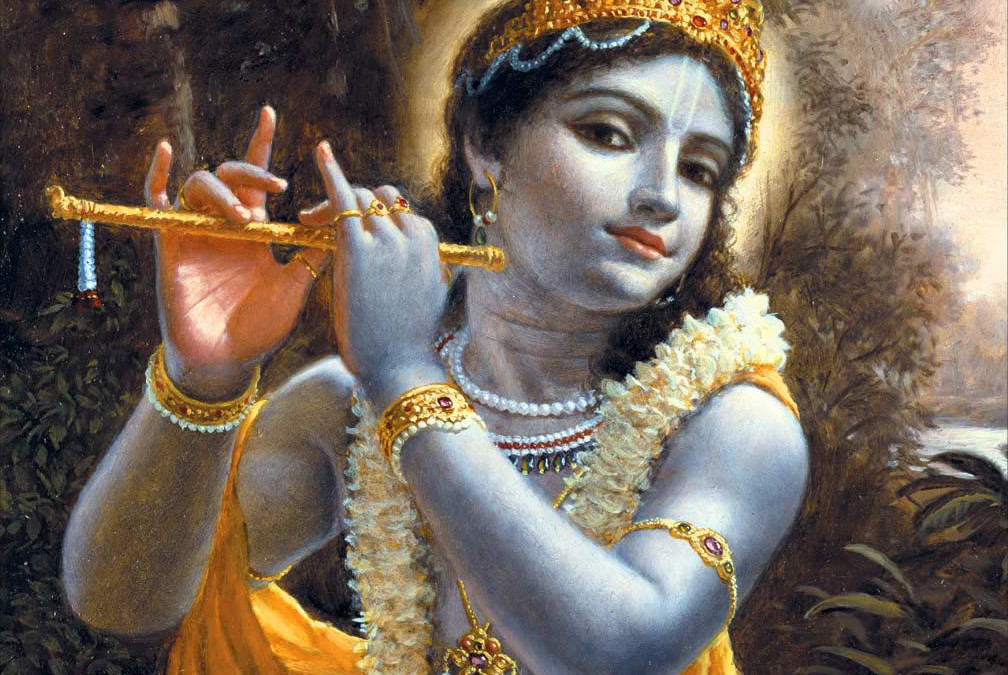VEDĀNTA IN SRIMAD BHĀGAVATAM:
[Bhāgavatāmṟutasāra: skandha 6; chapter 16, verses 51-56]
[Chatu-Sloki Bhāgavatam: skandha 2, Chapter 9, Verses: 33-36
अहं वै सर्व-भूतानि भूतात्मा भूत-भावनः I
शब्द-ब्रह्म परं ब्रह्म ममोभे शाश्वती तनू II 6.16.51
ahaṁ vai sarva-bhūtāni bhūtātmā bhūta-bhāvanaḥ /
śabda-brahma paraṁ brahma mamobhe śāśvatī tanū // 6.16.51
I am Myself all the creatures that are, and I am, too, the experiencing Self in them; I am the cause of their coming into existence and the Director and Controller of their activity; for the Veda and the Supreme Brahman are my eternal bodies.
लोके विततम् आत्मानं लोकं चात्मनि सन्ततम् I
उभयं च मया व्याप्तं मयि चैवोभयं कृतम् II 6.16.52
loke vitatam ātmānaṁ lokaṁ cātmani santatam /
ubhayaṁ ca mayā vyāptaṁ mayi caivobhayaṁ kṛtam // 6.16.52
You should learn to look upon Ātman as present throughout the objective world (as experiencer)
and the world as pervaded by ME.
यथा सुषुप्तः पुरुषो विश्वं पश्यति चात्मनि ।
आत्मानम् एक-देश-स्थं मन्यते स्वप्न उत्थितः ॥ ५३
yathā suṣuptaḥ puruṣo viśvaṁ paśyati cātmani /
ātmānam eka-deśa-sthaṁ manyate svapna utthitaḥ // 6.16.53
yathā—just as; suṣuptaḥ—sleeping; puruṣaḥ—a person; viśvam—the whole universe;
paśyati—perceives; ca—also; ātmani—in himself; ātmānam—himself; eka–deśa–stham—lying down in one place; manyate—he considers; svapne—in the dreaming condition; utthitaḥ—waking up;
It often happens that a dreamer dreams that he had been in a state of profound slumber and has passed into a dream in which he sees the world within himself; and a little later he imagines that he has waked up and finds himself lying down in a particular place.
एवं जागरणादीनि जीव-स्थानानि चात्मनः ।
माया-मात्राणि विज्ञाय तद्-द्रष्टारं परं स्मरेत् ॥ ५४
evaṁ jāgaraṇādīni jīva-sthānāni cātmanaḥ /
māyā-mātrāṇi vijñāya tad-draṣṭāraṁ paraṁ smaret // 6.16.54
evam—in this way; jāgaraṇa–ādīni—the states of wakefulness and so on; jīva–sthānāni—the living entity’s different conditions of existence; ca—also; ātmanaḥ—of the Supreme Self; māyā–mātrāṇi—mere illusory; vijñāya—knowing; tat—of them; draṣṭāram—the seer of all such conditions; param—the Supreme; smaret—one should always remember.
In the same way, the states of waking, dream and sleep of men’s everyday experience are not native to the self but are different states of the intellect (the limiting adjunct of the jīvā), which are superimposed on the Ātman by Māyā. By keeping these things in mind, one should realize the Ātman, the Supreme Witness of these different states, is different from them.
येन प्रसुप्तः पुरुषः स्वापं वेदात्मनस् तदा ।
सुखं च निर्गुणं ब्रह्म तम् आत्मानम् अवेहि माम् ॥ ५५
yena prasuptaḥ puruṣaḥ svāpaṁ vedātmanas tadā /
sukhaṁ ca nirguṇaṁ brahma tam ātmānam avehi mām // 6.16.55
You should see that the Atman, by virtue of whose presence as Witness, the jīva, plunged in dreamless sleep, knows that he has slept soundly, experiencing a happiness which was beyond the reach of the senses, is none other than Me, the Brahman.
yena—by whom (the Supreme Brahman); prasuptaḥ—sleeping; puruṣaḥ—a man; svāpam—the subject of a dream; veda—knows; ātmanaḥ—of himself; tadā—at that time; sukham—happiness; ca—also; nirguṇam—without contact with the material environment; brahma—the supreme spirit; tam—Him; ātmānam—the pervader; avehi—just know; mām—Me.
उभयं स्मरतः पुंसः प्रस्वाप-प्रतिबोधयोः।
अन्वेति व्यतिरिच्येत तज् ज्ञानं ब्रह्म तत् परम् ॥ ५६
ubhayaṁ smarataḥ puṁsaḥ prasvāpa-pratibodhayoḥ /
anveti vyatiricyeta taj jñānaṁ brahma tat param // 6.16.56
ubhayam—both types of consciousness (sleep and wakefulness); smarataḥ—remembering; puṁsaḥ—of the person; prasvāpa—of consciousness during sleep; pratibodhayoḥ—and of consciousness while awake; anveti—extends through; vyatiricyeta—may reach beyond; tat—that; jñānam—knowledge; brahma—the Supreme Brahman; tat—that; param—Supreme/transcendental.
When one remembers both his dreamless sleep and wakefulness, one must draw the natural conclusion that That which was uniformly present in both states must be different from both states. That consciousness or knowledge, jñāna, is the Brahman, and not something different from it.
[Verses 51-56, Canto 6, chapter 9, Srimad Bhāgavatam, vol. 1. Translated by N. Raghunathan, pp. 562-563; slightly modified; Word-meaning mainly based on Srila Prabhupada’s translation]
Chatu-Sloki Bhāgavatam:
[skandha 2, Chapter 9, Verses: 33-36]
अहम् एवासम् एवाग्रे नान्यद् यत् सद्-असत् परम्
पश्चाद् अहं यद् एतच् च यो ऽवशिष्येत सो ऽस्म्य् अहम् २.९.३३
ऋते ऽर्थं यत् प्रतीयेत न प्रतीयेत चात्मनि
तद् विद्याद् आत्मनो मायां यथाभासो यथा तमः २.९.३४
यथा महान्ति भूतानि भूतेषूच्चावचेष्व् अनु
प्रविष्टान्य् अप्रविष्टानि तथा तेषु न तेष्व् अहम् २.९.३५
एतावद् एव जिज्ञास्यं तत्त्व-जिज्ञासुनात्मनः
अन्वय-व्यतिरेकाभ्यां यत् स्यात् सर्वत्र सर्वदा २.९.३६
aham evāsam evāgre nānyad yat sad-asat param
paścād ahaṁ yad etac ca yo ‘vaśiṣyeta so ‘smy aham 2.9.33
ṛte ‘rthaṁ yat pratīyeta na pratīyeta cātmani
tad vidyād ātmano māyāṁ yathābhāso yathā tamaḥ 2.9.34
yathā mahānti bhūtāni bhūteṣūccāvaceṣv anu
praviṣṭāny apraviṣṭāni tathā teṣu na teṣv aham 2.9.35
etāvad eva jijñāsyaṁ tattva-jijñāsunātmanaḥ
anvaya-vyatirekābhyāṁ yat syāt sarvatra sarvadā 2.9.36
Before creation started, I alone was, naught else, neither gross, nor subtle nor the cause thereof; and I merely existed. Even after the coming into existence of the universe, I alone am (in undiminished and eternal perfection), and I am this universe too, and when the worlds are dissolved, what remains is only me.
Know that to be my Māyā because of which something that defies definition is seen as phenomenal appearance in the Self (Ātman) like an optical illusion, while the Real (the Self) is not seen, even as the node (Rāhu) is not seen among the planets.
Just as the gross elements have entered into all created things, gross and subtle, and yet have not entered them (that is, after their creation), even so I am in them and yet not in them.
So far should he, who wants to know the truth of the Self, investigate as to ascertain what it is that exists everywhere and always, whether by itself or with conjunction with anything else; for this is the Self (the Ātman).
[Verses 33-36, Canto 2, Chatper 9, Srimad Bhāgavatam, vol. 1. Translated by N. Raghunathan, p. 118; slightly modified]


Recent Comments